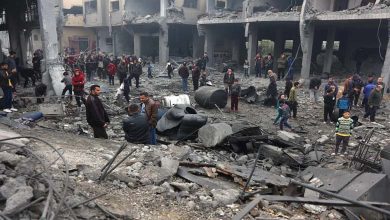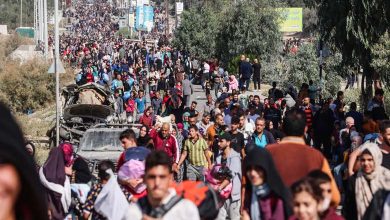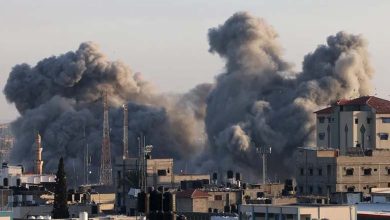Israel demands the International Court of Justice to reject the cessation of its military campaign in Gaza
The Israeli legal advisor considers the prosecutor's request as defamatory and undermining Israel's right to self-defense, accusing Hamas of seeking the annihilation of the Jewish people

Israel is expected to respond on Friday to accusations brought against it by South Africa before the United Nations International Court of Justice, claiming that its military operation in Gaza aims at genocide to eliminate Palestinian residents.
The Israeli legal team will strongly reject South Africa’s accusations when presenting its case before the highest court affiliated with the United Nations at 10:00 AM GMT. South Africa, which filed the lawsuit in December, has requested urgent measures from the court to order Israel to immediately halt its attacks.
Israel refutes the allegations of committing genocide, describing them as baseless, and asserts that South Africa acts as a shield for Hamas, which it considers a terrorist organization seeking to eradicate the Jewish state. Israel states that the ongoing campaign in Gaza aims to eliminate Hamas, the governing authority in the region, which launched an attack on southern Israel on October 7th, resulting in 1,200 deaths and 240 hostages.
Observers note that the Israeli military deliberately inflicts significant civilian casualties, explaining the high number of fatalities. Israel agreed to appear before the court to “refute” what it termed “baseless and unrealistic” accusations.
Thus, Tel Aviv has accepted to wear the “white suit,” as some Palestinians and Arab activists put it, a suit typically reserved in some countries like Egypt for defendants before conviction or for detainees pending trial.
While Israel describes the accusations as lacking any legal basis, the official Israeli broadcasting authority stated last Friday that Tel Aviv is concerned the International Court of Justice might issue a decision to halt the fighting in Gaza.
Other Israeli media outlets confirm serious concerns within Israeli security and prosecution institutions about the International Court accusing Tel Aviv of “genocide.”
In The Guardian, South African journalist Tony Caron writes that the “specter of international isolation that Israeli leaders have long feared” has finally materialized in the International Court of Justice.
Caron notes that most Israeli leaders did not expect this specter to appear through a lawsuit filed by South Africa accusing Israel of committing genocide. He highlights recent votes in the United Nations General Assembly, expressing shock at Israel‘s brutality in Gaza, but the international community remains unable to take decisive action.
Caron sees South Africa’s move as “exceptional” because accusing Israel of genocide implies accusing its diplomatic protector, the United States, of complicity in the worst crime.
The writer states that “Israel can rely on unlimited American support in this ‘systematic crime.’ It feels relieved to follow the United States in challenging international law, as seen in the ‘war on terror’ and the invasion of Iraq.”
Caron concludes that the genocide lawsuit against Israel at the International Court of Justice signals a loud voice to the rest of the world that solidarity based on values is once again a viable option, and a different global system is possible.
The Genocide Convention of 1948, established in the aftermath of the Nazi Holocaust, defines genocide as “acts committed with intent to destroy, in whole or in part, a national, ethnical, racial, or religious group.”
Since the start of Israel’s military campaign, nearly all of the approximately 2.3 million inhabitants of the Gaza Strip have been forced to evacuate their homes at least once, resulting in a humanitarian catastrophe.
South Africa has long supported the Palestinian cause after the apartheid era, a relationship formed when the Palestine Liberation Organization led by Yasser Arafat welcomed the African National Congress’s struggle against white minority rule.
The court is expected to issue a ruling on possible urgent measures later this month, but a judgment on genocide accusations may take years. International Court of Justice decisions are final and cannot be appealed, but the court lacks means to enforce its judgments.












